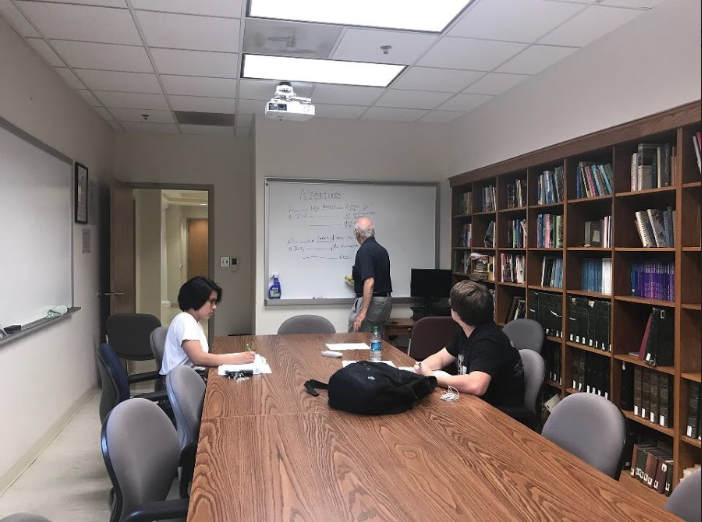Students learn Japanese language and culture at new conversation hours
3 min read
Chelsie Valencia
By MOLLY AVERY
Staff Writer
After many years, Japanese has found a home at Mary Washington in the form of conversation hours. On Mondays and Tuesdays, students can go to Combs 236 and take part in the hour-long event to further educate themselves on Japanese culture.
Japanese conversation hours were started by Minae Uehara, who is a Japanese Outreach Initiative (JOI) coordinator. She has been working at UMW since the beginning of August through the JOI program in Japan. Before she came to UMW, Uehara worked as an elementary school teacher and an assistant English teacher in Japan. Her role at UMW is to promote Japanese culture and language to the student population.
As a JOI coordinator, she does a lot of work outside of the university, such as visiting local public schools to present about Japan.
“For example, talking about Japanese food, teaching how to use chopsticks, origami hands-on activity, and so on,” said Uehara.
Besides starting the conversation hours at UMW, Uehara also speaks to classes. Sometimes she takes part in group discussions and gives presentations about Japan. She felt that starting the conversation hours was a good way to approach students who were interested in learning the language.
The conversation hours take place on Mondays from 4:30-5:30 p.m. and Tuesdays from 5-6 p.m. and are open to anyone at any experience level. During these hour-long meetings, attendees practice basic vocabulary, grammar, and have about 10-15 minutes of free conversation.
The hours easily cater to students of all experience levels. Junior psychology major Kaitlin Viloria went in already knowing some Japanese.
“Dr. Rabson and Minae Uehara challenge me with the language so that I can practice more complex grammar in addition to reviewing the basics,” said Viloria.
Other students appreciate the atmosphere of the hours.
Senior biology major Asher Gambale said that the hours were “a no-stress environment to learn a new language firsthand that required no experience.”
Uehara said that Japanese conversation hours have been in high demand for years.
“Several students at UMW have resided in Japan whose parents have worked there as military and civilian employees,” said Uehara. “Others have studied Japanese at high schools in Northern Virginia that teach it. I have met many students who said they would have chosen Japanese if there had have been options. Thus, there is a significant demand among students for regular Japanese language courses at UMW that is supported by faculty.”
Students are also enthusiastic about the idea of Japanese classes being added to Mary Washington’s course options.
“I absolutely love learning languages, and while I enjoy learning the languages that are offered here at UMW such as Spanish and Chinese, I unfortunately haven’t had the time to study or improve on my Japanese,” said Viloria. “As such, I have lost a little bit of what I taught myself.”
Gambale was also in support of the addition of Japanese classes.
“It’s such a fascinating language and surprisingly easy to pick up,” said Gambale.
Although there are no Japanese language classes at UMW, the school does offer a new course called Anime, Film, and Literature of Japan taught by Dr. Steve Rabson. All the seats in the class, which has no prerequisite and counts as a Global Inquiry credit, are completely full.
With the addition of Japanese conversation hours and a Japanese cultural appreciation class, many hope that Japanese will soon be added as language at UMW. Uehara believes students would love having the option, and said she wants to offer support to those eager to learn Japanese.
A previous version of this article incorrectly stated that the conversation hours take place in South Hall. It has since been corrected to say the conversation hours occur in Combs 236.


